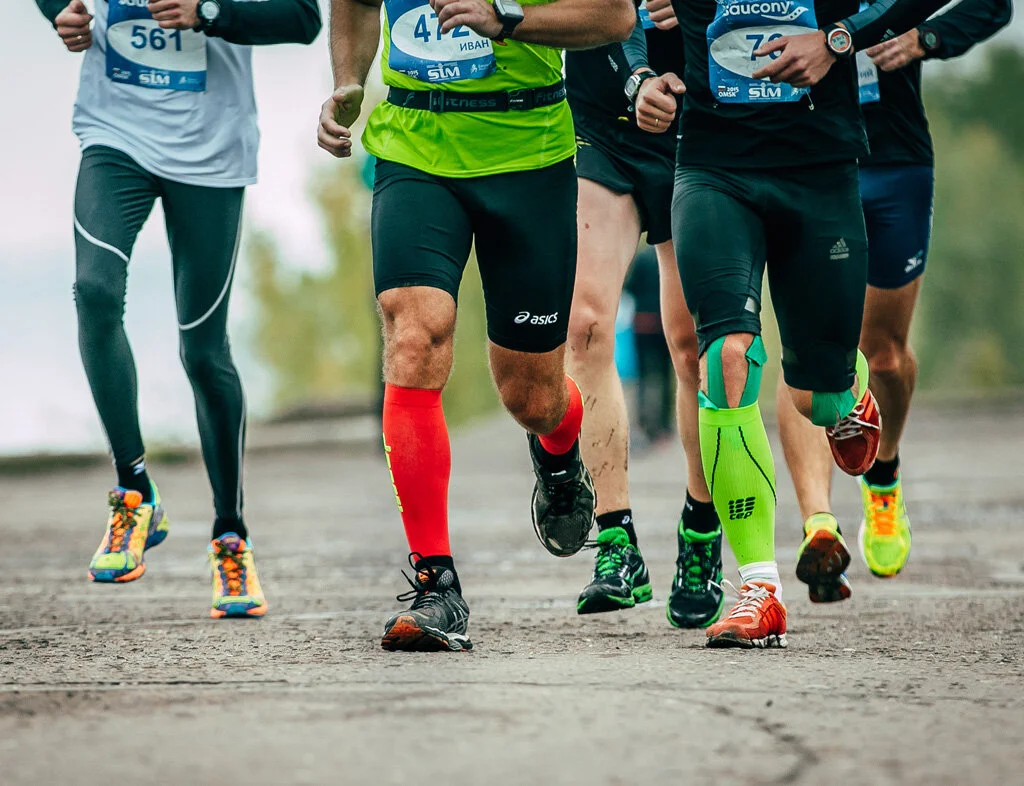Benefits of Compression Clothing
Can you break your old PR by just putting on a pair of compression socks?
Looking to get faster? Compression socks and shoes have been looked to for that performance gain
We’re all looking for that extra 2% thing that will help us run our best at our next race. A controversial hot button item for over a decade has been compression technology. If you’ve been around enough running groups you’ll meet people who swear by compression and other people who think it’s snake oil. Most people all have some anecdotal thoughts on how it worked or didn’t on them.
Before we begin we want to clarify, we’re not talking about knee high socks marketed as compression gear, we’re discussing medical grade technology which will be indicated on the item.
Compression companies like to talk a lot about compression and their benefits. To boil down the supposed claims into just a few bite sized pieces they claim compression can help the body in two separate ways:
Performance gain during a workout
Increased recovery by wearing them during and after the workout.
But what does science say about this hot button item?
Compression for Performance Gain
One of the most important benefits that is claimed by some is that compression gear increases our performance by increasing the blood flow to our muscles to help our body remove lactate from building up as we run allowing us to run at a high intensity for longer than we would be able to without compression gear.
In fact a 2016 study showed that there are performance gains to be had by wearing compression. But the tricky part about the findings were that they couldn’t tell if the gains were made from improvements in bio-mechanical areas or from perception.
a 2013 study showed that subjects muscles were more 4.5% more powerful after sub-maximal running, and the effort was considered easier than normal running shorts. Which also agrees with a 2006 study that found that compression gear “promote(d) a lower energy expenditure at a given prolonged sub-maximal speed.”.
It’s inconclusive how much of a performance gain you can get from wearing compression gear during exercise but there is a growing amount of evidence to show that there are gains to be made while wearing this gear. Even if it’s a 1% improvement- that can be the difference between a PR and a small miss.
Compression For Recovery
This is where the data begins to get tricky. Compression socks were touted as a great way to enhance recovery after a workout by decreasing muscle oscillation(moving) during exercise thereby reducing the amount of micro-tears that need to heal and increasing the blood-flow for recovery which brings valuable nutrients for recovery after a workout. But does this hold up to research?
A 1990 Study from Wake-Forest showed that there was no statistical difference between decreased lactate levels post exercise for those who wear compression and those who didn’t.
A 2011 study like many of the studies on recovery for compression show that the data is inconclusive. Runners experienced less soreness but many of the biological factors that go along with being less sore were not present.
Research is still being done on compression items affect on recovery. Many of these studies that are linked and others couldn’t disseminate if it was the compression gear that was providing the reduction in perceived soreness or if it was because of the placebo effect.
More research needs to be done in the area of recovery in-regards to compression. Much of the research has struggled to account for the placebo effect but it’s an area that is currently being highly research.
Compression socks might help you run fast and recover better- but the science is still out there
Will Compression help you run your best?
The data as it stands is still inconclusive.
While there is evidence that has shown there are performance gains to be had, most studies couldn’t agree on how much of a gain or on how this gain was achieved. In regards to recovery more research needs to be done. As it stands right now, many studies agree that perceived muscle soreness is decreased after exercise when wearing compression but it was unable to differentiate that from a placebo effect.
Some compression gear can be frankly quite expensive with an unknown upside. If it’s something you’re interested in trying I recommend going to your local running store to find out more about what tools exist that would fit your price range. The power of a placebo, even if you know it might be a placebo is very powerful.


